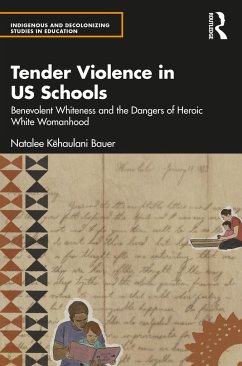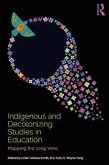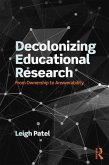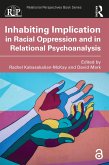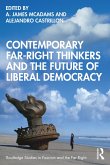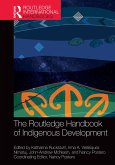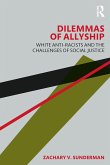Within educational research, the over-disciplining of Black and Indigenous students is most often presented as a problem located within pathologized or misunderstood communities. That is, theories and proposed solutions tend toward those that ask how we can make students of color from particular backgrounds more suited to US educational standards rather than questioning the racist roots of those standards. Tender Violence in US Schools takes as a provocation this "discipline gap," in exploring a thus far unconsidered stance and asking how white women (the majority of US teachers) have historically understood their roles in the disciplining of Black and Indigenous students, and how and why their role has been constructed over time and space in service to institutions of the white settler colonial state.
"Tender Violence in US Schools is a provocative book that provides a critical genealogy of the white woman teacher imagined as the heroic savior of children of color. Rooted in nineteenth-century settler colonial missionizing, Bauer persuasively argues that a gendered discourse of 'benevolent whiteness' continues to unjustly shape education today. Such teacher-savior narratives erase the love and learning Black and Native children receive from their own communities. With historic examples from Hawai i, South Carolina, and Dakota-Sioux Territory, alongside the contemporary Teach for America program, Bauer calls for a deep reckoning with the structural violence of education. A must-read for scholars in Education, Ethnic, Indigenous and Gender Studies."
Maile Arvin, Assistant Professor of Gender Studies and History, University of Utah, and author of Possessing Polynesians: The Science of Settler Colonial Whiteness in Hawai i and Oceania.
"Tender Violence in U.S. Schools offers a vivid critical genealogy of white women teachers grounded in a social history of missionization through three 19th century case studies across diverse geographies - Hawai'i, the Sea Islands off the coast of Georgia and South Carolina, and Dakota Sioux Territory. Interrogating the self-constructed discourse of white women's selflessness and self-proclaimed heroism, this compelling study offers a robust theory of 'benevolent whiteness' to understand education as a tool for settler colonial and white supremacist control vis-à-vis Indigenous and Black students in order to challenge this formation as it is still endemic to U.S. schooling into the present."
J. K haulani Kauanui, Professor of American Studies, Wesleyan University, and author of Paradoxes of Hawaiian Sovereignty
"If we really want to address racial and gender inequality in education, we need to dig deep into the history of the teaching profession. Tender Violencedoes just that, interrogating the cherished trope of the teacher-as-savior. A provocation, this book offers a genealogy of benevolent whiteness in US schooling and shows us how feminized white supremacy gets replicated in the present. Bauer calls all who care about education to confront these histories and to open space for Black and Indigenous community visions. Essential reading for current and future teachers and school leaders!"
Noelani Goodyear-Ka pua, Professor of Political Science, University of Hawai'i at Manoa, and author of The Seeds We Planted: Portraits of a Native Hawaiian Charter School.
Maile Arvin, Assistant Professor of Gender Studies and History, University of Utah, and author of Possessing Polynesians: The Science of Settler Colonial Whiteness in Hawai i and Oceania.
"Tender Violence in U.S. Schools offers a vivid critical genealogy of white women teachers grounded in a social history of missionization through three 19th century case studies across diverse geographies - Hawai'i, the Sea Islands off the coast of Georgia and South Carolina, and Dakota Sioux Territory. Interrogating the self-constructed discourse of white women's selflessness and self-proclaimed heroism, this compelling study offers a robust theory of 'benevolent whiteness' to understand education as a tool for settler colonial and white supremacist control vis-à-vis Indigenous and Black students in order to challenge this formation as it is still endemic to U.S. schooling into the present."
J. K haulani Kauanui, Professor of American Studies, Wesleyan University, and author of Paradoxes of Hawaiian Sovereignty
"If we really want to address racial and gender inequality in education, we need to dig deep into the history of the teaching profession. Tender Violencedoes just that, interrogating the cherished trope of the teacher-as-savior. A provocation, this book offers a genealogy of benevolent whiteness in US schooling and shows us how feminized white supremacy gets replicated in the present. Bauer calls all who care about education to confront these histories and to open space for Black and Indigenous community visions. Essential reading for current and future teachers and school leaders!"
Noelani Goodyear-Ka pua, Professor of Political Science, University of Hawai'i at Manoa, and author of The Seeds We Planted: Portraits of a Native Hawaiian Charter School.

